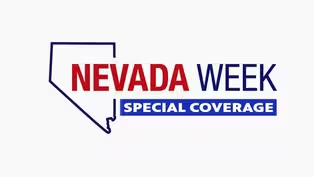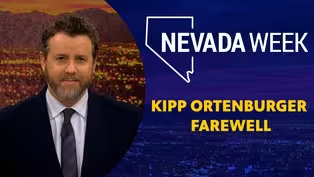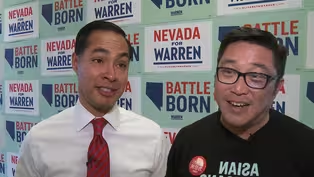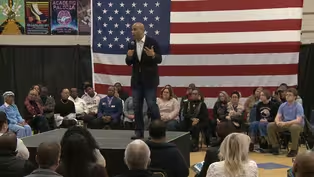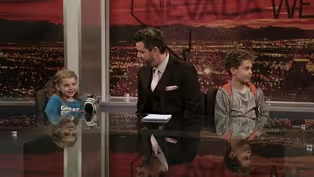Martin Smith from FRONTLINE: America and the Taliban
Clip | 5m 33sVideo has Closed Captions
Producer Martin Smith talks about the new series FRONTLINE: America and the Taliban.
Nevada Week’s Maria Silva talks with producer and correspondent Martin Smith about the new three-part series FRONTLINE: America and the Taliban. Smith explains how he was able to get interviews with Taliban leaders who haven’t talked to American journalists in the past.
Problems playing video? | Closed Captioning Feedback
Problems playing video? | Closed Captioning Feedback
Martin Smith from FRONTLINE: America and the Taliban
Clip | 5m 33sVideo has Closed Captions
Nevada Week’s Maria Silva talks with producer and correspondent Martin Smith about the new three-part series FRONTLINE: America and the Taliban. Smith explains how he was able to get interviews with Taliban leaders who haven’t talked to American journalists in the past.
Problems playing video? | Closed Captioning Feedback
How to Watch
is available to stream on pbs.org and the free PBS App, available on iPhone, Apple TV, Android TV, Android smartphones, Amazon Fire TV, Amazon Fire Tablet, Roku, Samsung Smart TV, and Vizio.
Providing Support for PBS.org
Learn Moreabout PBS online sponsorshipSupport for Nevada Week is provided by Senator William H. Hernstadt the war in Afghanistan began in the wake of the 911 attacks and ended in August 2021 with a chaotic exit of American troops.
Now FRONTLINE explores why America went into the country in the human cost of the 20 years of conflict.
Joining us to talk about the three part series America and the Taliban is Martin Smith, producer and correspondent for Frontline.
Thank you so much for joining us.
MARTIN Thank you for having me.
And let's talk about this.
You actually spent 18 months in Afghanistan.
You spoke with numerous Taliban officials.
In watching this part, the first part of this.
How did you gain their trust?
Oh, I don't know if they trusted us.
They were willing to sit down because they were victorious and they were very high on that victory.
And so initially, after the fall of Kabul, they wanted to keep talking and have have you know, it was a field day for them.
They got a little more closed as we as time went on.
Now, because some of them, they had never spoken before.
And they actually, again, seeing some of the images in this documentary and it did feel like they did gain some of their I even want to say the respect to be allowed into the country and to be able to interview them.
That is really such an important part of this documentary.
It is because for years I covered the war from the side of the U.S. and NATO forces, but I couldn't cross the battle lines and talk to the Taliban.
Now the war is over, and I was able to go in and talk to the Taliban.
And so, you know, it was important to see the war from both sides.
And let's talk about seeing the war from both sides.
You interviewed the Taliban leaders.
You also interviewed our U.S. leaders as well, and as well as our troops who were there doing the war.
That's right.
It was important to hear from all of these players, I think, especially from the troops on the ground.
It was important.
These are the people that put their lives at risk.
Many of them lost their lives, 24, 2500 of them lost their lives.
And, Martin, you've been covering this for Afghanistan in the Middle East, for frontline for two decades.
It's a subject you know very well.
In part of the documentary and reading about this, you wrote in said our new series, Traces of Mistakes, Miscalculations and Hubris that allowed this to happen.
Let's talk about that.
Well, we went in with a great deal of American idealism that somehow the we carried into Afghanistan, the belief that they want to be like us.
They want to have a country like ours.
And this was the hubris of our approach, and it was sadly mistaken.
And let's also talk about some of these images.
Again, sometimes we're over here.
We tend to, you know, maybe put that in the back burner, forget about what has happened over there.
But to see some of these heartbreaking images, one of them was a woman holding her child in the middle of the street.
The children malnourished.
What when you were there, what do you want us to take away from this three part series when I hope that people can can get a sober understanding of just what we tried to do and what the odds were that it would succeed.
I think that we have this sort of optimism that is misplaced that we can go halfway around the planet into a culture that we don't understand very well and successfully manipulated into something that resembles a Western state.
And let's talk about again, this is airing right here at Vegas PBS three part series.
I do want to talk about your production team because, again, to see these images, you went in there again, it's still very dangerous place.
Let's talk about your production, also partner of Marcela Gaviria, as well as the rest of your production company and your crew.
Very impressed by what you did.
Thank you very much.
We we go very small on the ground.
So it was myself, fellow producer Marcello Gaviria, who also happens to be my wife, and with a longtime cameraman who's covered Afghanistan himself for even more than 20 years.
He was there during the first Taliban rule in the nineties.
Scott Anger.
So we went in, the three of us on the road.
We hired local producers, local fixers, as we call them, who we depended on for their contacts and their language skills and drivers.
We just we were our presence on the ground is small.
Go ahead.
Yeah, no, our presence on the ground is small, and that's it's it's workable that way.
Otherwise, you go in with many vehicles and many crew.
It doesn't you know, you don't really get to see too much.
And all of you did a wonderful job.
We thank you so much.
And again, it will be airing right here on Vegas PBS.
Thanks for joining us and thank you so much for what you do.
Thank you very much.
And you can watch the first part of the series Frontline America and the Taliban tonight at 10 p.m. right here on Vegas PBS.
It will also be available on the PBS app.
Nevada Week celebrates 5 years and welcomes a new season
Video has Closed Captions
Clip | 30s | Nevada Week celebrates its fifth-year anniversary and begins its sixth season. (30s)
Martin Smith from FRONTLINE: America and the Taliban
Video has Closed Captions
Clip | 5m 33s | Producer Martin Smith talks about the new series FRONTLINE: America and the Taliban. (5m 33s)
Nevada Week: Kipp Ortenburger Farewell
Video has Closed Captions
Clip | 1m 1s | Kipp Ortenburger's farewell from Nevada Week. (1m 1s)
Julian Castro on Behalf of Elizabeth Warren
Video has Closed Captions
Clip | 3m 52s | Secretary Julian Castro discusses childcare and healthcare. (3m 52s)
A Conversation with Cory Booker
Video has Closed Captions
Clip | 11m 30s | Senator Cory Booker sits down with Kipp Ortenburger to discuss education and gun violence. (11m 30s)
Video has Closed Captions
Preview | 20s | A public affairs program focused on critical issues facing Nevada. (20s)
Take Your Kids to Work Day on Nevada Week
Video has Closed Captions
Preview | 1m 37s | Kipp gives his son and daughter a chance to see what it's like to be on the show. (1m 37s)
Nevada Democracy Project Promo
Video has Closed Captions
Preview: Special | 1m 27s | Naoka and Amber introduce the Nevada Democracy Project (1m 27s)
Providing Support for PBS.org
Learn Moreabout PBS online sponsorship
- News and Public Affairs

Top journalists deliver compelling original analysis of the hour's headlines.

- News and Public Affairs

FRONTLINE is investigative journalism that questions, explains and changes our world.












Support for PBS provided by:

